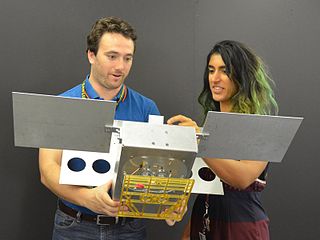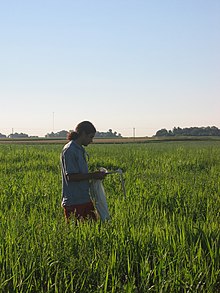
Agricultural science is a broad multidisciplinary field of biology that encompasses the parts of exact, natural, economic and social sciences that are used in the practice and understanding of agriculture. Professionals of the agricultural science are called agricultural scientists or agriculturists.

Engineers, as practitioners of engineering, are professionals who invent, design, analyze, build and test machines, complex systems, structures, gadgets and materials to fulfill functional objectives and requirements while considering the limitations imposed by practicality, regulation, safety and cost. The word engineer is derived from the Latin words ingeniare and ingenium ("cleverness"). The foundational qualifications of a licensed professional engineer typically include a four-year bachelor's degree in an engineering discipline, or in some jurisdictions, a master's degree in an engineering discipline plus four to six years of peer-reviewed professional practice and passage of engineering board examinations.

Agronomy is the science and technology of producing and using plants by agriculture for food, fuel, fiber, chemicals, recreation, or land conservation. Agronomy has come to include research of plant genetics, plant physiology, meteorology, and soil science. It is the application of a combination of sciences such as biology, chemistry, economics, ecology, earth science, and genetics. Professionals of agronomy are termed agronomists.
Agrology is the branch of soil science dealing with the production of crops. The use of the term is most active in Canada. Use of the term outside Canada is sporadic but significant. The term appears especially well established in Russia and China, with agrologists on university faculty lists and agrology curricula.
Agribusiness is the industry, enterprises, and the field of study of value chains in agriculture and in the bio-economy, in which case it is also called bio-business or bio-enterprise. The primary goal of agribusiness is to maximize profit while satisfying the needs of consumers for products related to natural resources such as biotechnology, farms, food, forestry, fisheries, fuel, and fiber.

West Visayas State University is a public normal research university located in La Paz, Iloilo City, Western Visayas region of the Philippines. It was established in 1924 as Iloilo Normal School under the tutelage of the Thomasites, but dates back its founding in 1902 as a part of Philippine normal school system with Iloilo National High School established by the American colonial government. It later became West Visayas State College in 1965 and acquired its university status becoming West Visayas State University in 1986.
Professional agrologist in Canada, also called agronome in Québec, is the professional designation for the agrology profession in Canada. There are more than 10,000 professional agrologists and agronomes in Canada, registered in ten (10) provincial institutes of agrologists. In the United States the professional designation is Certified Professional Agronomist.
The University of the East College of Dentistry was first established as a unit of the Philippine College of Commerce and Business Administration in 1948. The college is one of the pioneers of dental education and labeled as one of the top dental schools in the Philippines.

The Professional Regulation Commission, otherwise known as the PRC, is a three-man commission attached to Department of Labor and Employment (DOLE). Its mandate is to regulate and supervise the practice of the professionals who constitute the highly skilled manpower of the country. As the agency-in-charge of the professional sector, the PRC plays a strategic role in developing the corps of professionals for industry, commerce, governance, and the economy.
The Philippine Nurse Licensure Examination is a 500-item multiple choice exam to test basic nursing level competency which considers the objectives of the nursing curriculum, the broad areas of nursing and other related disciplines and competencies. It is held every June and December annually in various public schools throughout the Philippines. Room assignment for the exams are posted outside the Professional Regulation Commission building at least three days before the exam.

The University of the Philippines Los Baños College of Forestry and Natural Resources is one of the 11 degree-granting units of the University of the Philippines Los Baños (UPLB). It started as the Forest School under the UP College of Agriculture in 1910, making it the oldest forestry school in the Philippines. It is one of the five founding units of UPLB upon its establishment in 1972.
The Professional Regulatory Board of Architecture(PRBoA) was an board that regulates architecture in the Philippines. It existed from November 3, 2006 to November 23, 2012, and had three members.

Agriculture in the Philippines is a major sector of the economy, ranking third among the sectors in 2022 behind only Services and Industry. Its outputs include staples like rice and corn, but also export crops such as coffee, cavendish banana, pineapple and pineapple products, coconut, sugar, and mango. The sector continues to face challenges, however, due to the pressures of a growing population. As of 2022, the sector employs 24% of the Filipino workforce and it accounted for 8.9% of the total GDP.
Southern Luzon State University, formerly known as Southern Luzon Polytechnic College (SLPC), is the premier, state-funded higher education institution in Quezon Province in the Philippines operating by virtue of Republic Act 9395. It is composed of 11 campuses in the province of Quezon, with the main campus situated in the Municipality of Lucban.

Agricultural engineering, also known as agricultural and biosystems engineering, is the field of study and application of engineering science and designs principles for agriculture purposes, combining the various disciplines of mechanical, civil, electrical, food science, environmental, software, and chemical engineering to improve the efficiency of farms and agribusiness enterprises as well as to ensure sustainability of natural and renewable resources.

Health professional requisites refer to the regulations used by countries to control the quality of health workers practicing in their jurisdictions and to control the size of the health labour market. They include licensure, certification and proof of minimum training for regulated health professions.

The Central Philippine University College of Medicine, also referred to as CPU COM, CPU College of Medicine, CPU ColMed or CPU Medicine, is the medical school of Central Philippine University, a private university in Iloilo City, Philippines. Established in 2002 and opened in 2003 with its first dean, Dr. Glenn A. M. Catedral, it is one of the youngest colleges and academic units of the university.

Filipino seamen, also referred to as Filipino seafarers or Filipino sailors, are seamen, sailors, or seafarers from the Philippines. Although, in general, the term "Filipino seamen" may include personnel from the Philippine Navy or the Philippine Marine Corps, it specifically refers to overseas Filipinos who are "sea-based migrant Filipino workers".

The history of physical therapy in the Philippines relates how physical therapy started in the Philippines and how it evolved as a profession through three significant phases in the history of the Philippines: from the American era leading to the Japanese occupation of the islands during World War II, and up to the modern-day time period of the independent Philippine Republics. It was introduced in the Philippines ahead of rehabilitation medicine.
The San Beda College of Medicine is the medical school of the San Beda University in Manila established in 2002.












